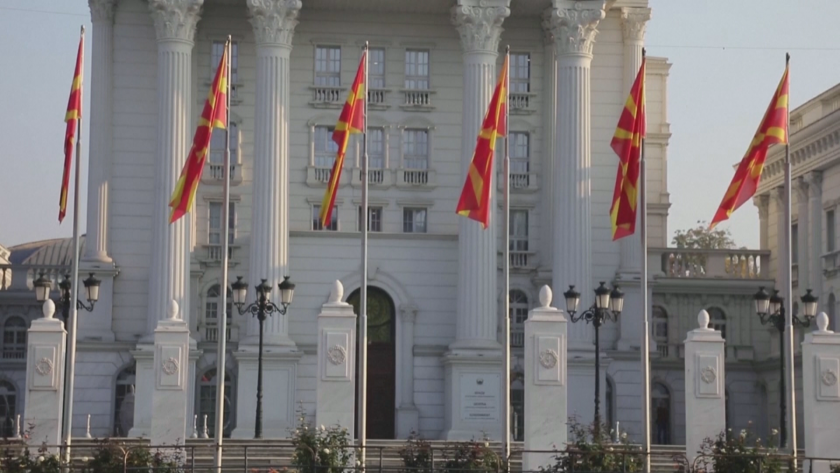
The visit of Bulgaria’s Prime Minister to Skopje has been postponed but not cancelled. This became clear today, January 11 and was confirmed by the Council of Ministers. The reason is that the PM Kiril Petkov is in self-isolation, after yesterday he and the chief of staff and government spokesperson, Lena Borislavova, were in contact with the Speaker of Parliament, Nikola Minchev, who tested positive for coronavirus.
This emerged shortly after the Consultative Council on National Security meeting was held, at which the members deprived the Executive of the opportunity to set deadlines for reaching an agreement with Skopje.
PM Petkov himself confirmed in a video message that he would go to Skopje by the end of the month.
"We have united around one common goal: good neighbourliness. We reaffirmed the current position of the Republic of Bulgaria in relations with the Republic of North Macedonia, but at the same time set a new start for dialogue to take place in the coming months with the Republic of North Macedonia. With this new start we have to discuss topics important for both countries, such as the rights of Bulgarians in North Macedonia, as well as common infrastructure, common cultural calendar, European integration, history. This month I will go to the Republic of North Macedonia. Firstly, because it is our turn, but more importantly because we want to show that through constructive dialogue, dialogical actions, we can do much more than what has happened in the past few years," Petkov said.
The future Prime Minister of Bulgaria’s south-western neighbour - commenting on the Consultative Council on National Security (CCNS) meeting convened by President Radev - said that he expects the Bulgarian Prime Minister to negotiate on topics aimed at the future, not the past.
Trust between the two countries must be restored, Kovachevski commented on the decisions of the CCNS.
Without mentioning the 2017 Friendship Treaty, Kovachevski believes that the focus of bilateral talks should be shifted from history to current topics.
According to experts in Skopje, it would be counterproductive for the RNM’s negotiation process with Brussels to be tied to deadlines.
Media in Skopje claimed that there were two concessions made by President Rumen Radev at yesterday's CCNS. Firstly, the decisions do not include Sofia's insistence on changing the Constitution of RNM in order to protect Macedonian Bulgarians.
And, secondly, that Bulgaria will monitor the implementation of the 2017 Treaty, but without insisting that it be part of the Skopje Negotiating Framework.
"They have very conveniently interpreted the words of President Radev. He stated very emphatically that the inclusion of Bulgarians along with other nations in the preamble to the Constitution of North Macedonia is our key request," said historian Kiril Iliev.
Experts remind that Bulgaria is not for an eternal veto, but for Skopje's membership in the EU, when it fulfils its agreed commitments with Bulgaria.
"The launch of the RNM's negotiations with the EU actually depends on them, and it does not depend so much on time but on the steps taken and reforms in the RNM, things that we expect to happen," Iliev said.
However, breaking with the Yugoslav past, experts say, will be a slow process.
"Although the RNM has become part of NATO, that sinister matrix exists, in which there is a re-enactment of personnel who have been brought up in that Yugoslav spirit, " Iliev said.
Former Prime Minister Boyko Borissov, who signed the treaty in 2017, commented that the CCNS was completely unnecessary and was an attempt to show President Radev's supremacy over the cabinet. According to him, PM Kiril Petkov no longer has the opportunity to maneuver on the subject.
“The President has deprived Prime Minister Petkov of any opportunity to maneuver, because when all political parties are at one position, they cannot even seek any reaction in parliament at the moment," Borissov said.
He believes the Republic of North Macedonia and Albania should join the EU when Skopje abides by the Treaty of Friendship and Good Neighbourliness.
Over the years, Borissov's government has been criticized for the 2017 Treaty being flawed and not entirely specific, which allows Skopje to fail to implement it.
 ECB President Christine Lagarde: I warmly welcome Bulgaria to the euro family
ECB President Christine Lagarde: I warmly welcome Bulgaria to the euro family
 New Year Brings Higher Minimum Wage but Frozen Unemployment and Maternity Benefits
New Year Brings Higher Minimum Wage but Frozen Unemployment and Maternity Benefits

 България в еврозоната: Любопитни факти за първите минути с новата валута
България в еврозоната: Любопитни факти за първите минути с новата валута